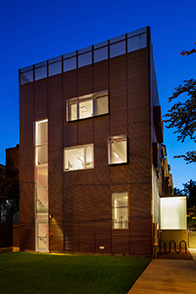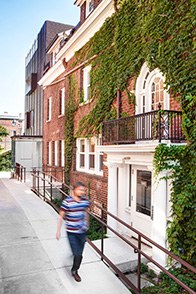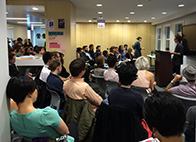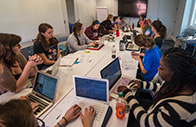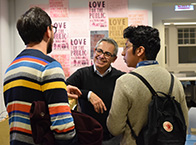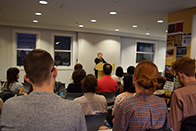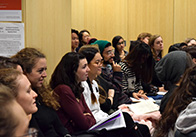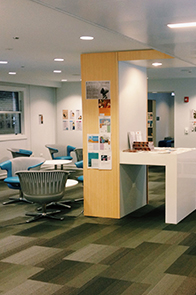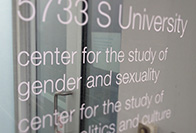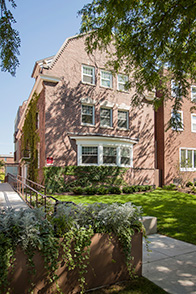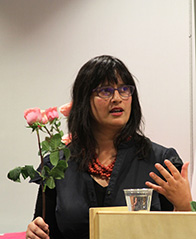Projects Archive
- Alternate Realities and Virtual Worlds
- Artists' Salon
- Care @ Chicago
- Civil Islam Initiative
- Closeted/Out in the Quadrangles
- Contexts of Coalition
- Counter Cinema/Counter Media Project
- Experience of Women
- Feminist Theory
- Gender, Sexuality and Global Capitalism
- Late Liberalism Project
- Lesbian & Gay Studies
- Precarious Citizenship
- Pre-modern Body Project
- Queer Latina/o Studies Lecture Series
- Sexual Violence on Campus
- Sexualities in Africa and the African Diaspora
- Sexuality and Gender in the Age of Global Politics
- Social Media Project
- Women in Science
Alternate Realities and Virtual Worlds
This project will be organized around using games, science fiction and virtual worlds to open up conversations about gender, and sexualities. In the last several years, experimental and indie video games, as well as analog genres such as tabletop and live-action role-playing games, have emerged as a novel means for engaging with issues such as depression, transgender identities, anxiety, addiction, transgender and queer identities, homophobia, and sexual violence. In this project, we will invite undergraduate students, graduate students, and faculty to participate in a series of events that focus on play as a form of inquiry into questions of world-building and negotiating social difference.
Artists’ Salon
The Artists' Salon at the Center for the Study of Gender and Sexuality seeks to showcase artists creating innovative work focusing, in diverse ways, and in diverse media, on gender and sexuality. The Artists' Salon provides the Center with a serious and thought-provoking exhibition gallery space where artwork is on display for students, faculty, and artists alike to enjoy and discuss together. The Artists' Salon exhibits work from both established artists, such as in the 2012 Alison Bechdel show “Fevered Archives,” and from up and coming artists in the Chicago area and elsewhere. By making the Center a place to interact with art on campus, we also hope to start conversations about feminist art and artmaking with members of the vital Chicago art community outside of campus, creating connections between students, faculty, and practitioners around issues of gender and sexuality.
On “Fevered Archives”:
Windy City Media Group
Chicago Maroon
Care @ Chicago
Care@Chicago, a series organized by the Center for the Study of Gender and Sexuality (CSGS) and co-sponsored by the Center for the Study of Race, Politics, and Culture, will run throughout the month of February 2017.
The University of Chicago is associated more with rigor, ambition and social division than care and caring: care is traditionally associated with women and emotions, often delegated to the economically hyper-exploited, and not often considered central to the life of ideas. But however unevenly distributed, vulnerability, stress, and compensations for them are everywhere in our immediate as well as larger cultural environment.
Care@Chicago will investigate structural stressors and reparative acts and practices for individuals and communities in the contemporary world.
2019
Friday, February 1 at 12:00pm
Come-As-You-Are Yoga with Anna Schabold
Wednesday, February 6 at 6:00pm
Queer Game Night: Part 1
Friday, February 8 at 12:00pm
Come-As-You-Are Yoga with Anna Schabold
Monday, February 11 at 5:00pm
Queerness to the Front: Redefining Our Relationships
at the Center for Identity + Inclusion - 5710 S Woodlawn Ave
Thursday, February 14 at 5:00pm
Valentine’s Study Break
Friday, February 15 at 12:00pm
Come-As-You-Are Yoga with Stephanie Brulloths
Friday, February 22 at 12:00pm
Come-As-You-Are Yoga with Stephanie Brulloths
Monday, February 25 at 4:30pm
Julietta Singh, "No Archive Will Restore You"
Wednesday, February 27 at 6:00pm
Queer Game Night: Part 2
Location TBA
Thursday, February 28 at 5:30pm
Feminist/Queer Praxis: Counseling Transgender Youth
2018
Friday, February 2 at 11:00am
Come-As-You-Are Yoga with Anna Schabold
Wednesday, February 7 at 7:00pm
Pleasures of Sex Workshop
Open to UChicago undergraduate students only
Friday, February 9 at 11:00am
Come-As-You-Are Yoga with Anna Schabold
Monday, February 12 at 6:00pm
Valentine’s Study Break
Wednesday, February 14 at 5:00pm
Care and Self-Care as Researchers
Friday, February 16 at 11:00am
Come-As-You-Are Yoga with Anna Schabold
Wednesday, February 21 at 5:00pm
Artists' Talk and Celebration || "Can’t Wait: Participate" an exhibition by Angela Davis Fegan
Thursday, February 22 at 12:30pm
Print workshop and demonstration || "Can’t Wait: Participate" an exhibition by Angela Davis Fegan
Friday, March 2 at 11:00am
Come-As-You-Are Yoga with Anna Schabold
2017
Friday, February 3 at 11:00am
Come-As-You-Are Yoga with Anna Schabold
Monday, February 6 at 4:30pm
Exhibition Opening: Romi Crawford, "Radical Relations! Memory, Objects and the Generation of the Political"
Thursday, February 9 at 4:30pm
Joshua Chambers-Letson, "Nina Simone and the work of Minoritarian Performance"
Friday, February 10 - all-day
Care@Chicago Day - A full day of self- and community-care activities for students and staff that include a discussion with mental health professionals, yoga, treats, and crafts, including a session on making “valentines to the future”
Thursday, February 16 at 4:30pm
Kristel Clayville, “Avoiding Burnout: Self-Knowledge and Care for Dark Times”
Friday, February 17 at 11:00am
Come-As-You-Are Yoga with Anna Schabold
Thursday, February 23 at 4:30pm
"Art & Care as Resistance & Love" panel with Lauren Ash, Lauren Berlant, Laura Letinsky, & Karen Reimer
Friday, February 24 at 11:00am
Come-As-You-Are Yoga with Anna Schabold
Civil Islam Initiative
The Civil Islam Initiative runs programming, conferences, and courses to serve the needs of a growing Muslim student body and to raise critical dialogue to facilitate understanding and respect regarding contemporary issues Islamophobia-industry among academics, activists, media, policymakers, and public within the Ummah & between the Ummah and Western contexts. While the Bush and Obama administrations have highlighted Islam as a faith of peace and Muslims in America as peaceful citizens, laws and policies passed and supported under their administrations over (Muslim) charitable giving, wire-tapping, surveillance, involuntary registration of men from Muslim majority countries, and so on, illustrate the ambiguous place of Muslims in America. With 6-8 million Muslims in America and record numbers involved in civic service, the need to understand and engage this population in the face of increasing distrust and even hostility towards Islam is crucial. The Initiative addresses the following questions: What are the ways in which Islam has played a formal or informal role in political, economic, and social life in America, and how have federal and state governments, civil society organizations, and people 'on the ground' responded? Given the rich civically engaged work of many Muslim-American groups, how can Muslim Americans facilitate the nation's domestic and foreign policies particularly with respect to Muslim-majority countries? Because women are central to the public image and religious and cultural expressions of Islam in America and abroad, and because the roles of Muslim women are generally limited in religious leadership but expansive in civic leadership, CSGS is well-positioned to lead this programmatic effort.
Piloted in 2012-2013, the Initiative held events on the Anti-sharia movement, Anti Muslim narrative in Hollywood, Intra-faith dialogue, Muslim civic leaders to engage abroad, US Foreign policy ramifications of social media gone viral, and other topics. The reach of the Initiative has been domestic and global: 300+ Chicagoans attend, Dr. Jamal has advised President Obama's staff and been invited to offer Congressional Testimony, and address United Nations. CII recorded lectures have been accessed and utilized by 500+ leaders in government, media, law, policy, education from North America, Middle East, Africa, Asia.
UChicago partners include: the College, Rockefeller Chapel, Divinity School, Law School, Department of Political Science, Center for Middle Eastern Studies. External partners include: Austrian Consulate General, Unity Productions Foundation, Harran Productions, Whitecloud Press, Institute for Social Policy & Understanding, McKinsey India.
Closeted/Out in the Quadrangles: A History of LGBTQ Life at the University of Chicago
View the Web ExhibitIn 2011, the Center for the Study of Gender and Sexuality launched Closeted/Out in the Quadrangles, a project documenting lesbian, gay, bisexual, transgendered, queer and questioning (LGBTQ) life at the University of Chicago from the early twentieth century through the present day. In Spring 2015, the project culminated in an exhibition in the Special Collections Research Center at Regenstein Library and a permanent oral history archive that can be accessed by future generations of researchers and community members.
In addition to producing new scholarship, the project has contributed to building community and expertise around the history of sexuality across disciplines by providing undergraduate and graduate students at the University space for research and intergenerational mentorship. Over the past four years, the project has offered a yearly undergraduate course, training students in the practice of oral history and archival research in gender and sexuality and exploring LGBTQ history. In Spring 2015, Lauren Stokes, project co-coordinator and exhibit curator taught a course on global sexualities (GNSE 22804) that coincided with the exhibition in Special Collections.
Visit the project pageContexts of Coalition
Project Director: Chase Joynt, Postdoctoral Scholar, Sociology and CSGS
Coalitional politics and strategies have long been foundational tenets of community-based activist initiatives, and inspired the creation of interdisciplinary pedagogies. Contexts of Coalition invites activists and artists working on the vanguard of social issues to give public talks and lead practice-based workshops at CSGS for interested participants. Invited guests include ACLU Staff Attorney Chase Strangio, artist and activist Syrus Marcus Ware, and Amin Husain and Nitasha Dhillon from the MTL collective.
2017-18 Events- Thursday, January 11, 2018
Syrus Marcus Ware, "Art, Activism and the Movement for Black Lives" - Tuesday, November 7, 2017
What Can the Law do for LGBT Rights? A conversation with ACLU's Chase Strangio
Counter Cinema/Counter Media Project
Project Director: Jennifer Wild, Cinema and Media Studies
The Counter Cinema/Counter Media project focuses on film and media practices that resist or "counter" the language and messaging of dominant film and media outlets, platforms, and traditions. Historically, counter practices have been understood both an active opposition to the codes, uses, and ideology of mainstream film and media, and the attempt to generate an alternative grammar or set of rules for constructing meaning, narrative, and visual representation. While the origins of counter-cinema are rooted largely in early experimental filmmaking and the avant-garde, the term came to the fore in the 1970s with the rise of feminism, feminist film theory, and political modernism; it extends into politically militant and collective cinema approaches and anti-colonial "Third cinema" traditions.
Since the inception of this project in 2012, there have been vast transformations in what we might now think of counter media practices, whether in cinema or in media broadly conceived. On the one hand, the CC/CM project continues to ask the following questions: what is the visual, formal language of opposition, and what is its relevance to the issues of gender and sexuality in the twenty-first century? Which aspects of resistant visual language remain potent, and which have been absorbed into the dominant vernacular of our film and media landscape? Does the form of resistance still matter?
On the other hand, the most urgent task of CC/CM project today is to grapple with our contemporary media landscape’s discourses of truth and falsehood, and to explore the range of media platforms that are used to promote or decry political ideologies. In our era of “fake news,” diverse “resistance” movements across the political spectrum, terrorism and counter-terrorism strategies, and evolving forms of propaganda, the CC/CM project promotes research about how gender and sexuality are targeted, exploited, or weaponized toward political ends.
Experience of Women
Spring 2009
"On Equal Terms": Educating Women at the University of Chicago
This multimedia exhibit, organized by CSGS and Special Collections at the Regenstein Library, included archival material and oral histories. This exhibition was the result of a unique collaboration among undergraduates, graduate students, library staff, and faculty at the University of Chicago. It was part of a larger CSGS project on the history of women at the University that included seventy-one oral histories from the University's alumae, faculty, and staff as well as finding guides for the oral histories and the Regenstein Library's archival resources.
A Guide for Researchers in the Archives
Keyword Finding Aid
The University of Chicago has been the subject of much scholarly attention over the years, but for those of us involved in this project, it soon became clear that paying particular attention to women and gender illuminates previously unexplored chapters of its past and makes familiar stories look much different. Women have very different stories to tell about the experiments in co-education and faculty diversification; the experience of the classroom, the laboratory, the dorm, and the streets of Hyde Park; the problems of mentorship, intellectual community, and career advancement; the opportunities for political action and community involvement, for friendship, romance, and sexual experimentation.
In our research, we uncovered more material documenting the experiences of Chicago women than we had previously imagined. These rich sources have answered some, but not all, of our questions. While sources on undergraduate life were particularly rich, there is still much to learn about graduate women and faculty experiences; about women of color; and about the late emergence of gender studies as a field of study at Chicago. We are hopeful that this survey will encourage future research on the workings of gender in the intellectual and physical spaces of the University.
An Introduction to the Exhibit:
The University of Chicago's original articles of incorporation, crafted in 1892, state that the institution will "provide, impart, and furnish opportunities for all departments of higher education to persons of both sexes on equal terms," thus writing coeducation into the University's founding principles. Yet integrating the sexes into the curriculum, research agenda, and extracurricular life proved to be a difficult and as yet unfinished task. The history of women at the University of Chicago is uneven, full of successes and failures that reflect both Chicago's unique intellectual community and larger trends in academia. Coeducation provided women with exciting academic and social opportunities, but it did not necessarily translate to equality of treatment or equal distribution of resources. While women have often stood among the most accomplished members of the University community, their history on campus raises important questions about how and where women and women's issues fit into academia-questions that still resonate today.
The University has provided women with space for teaching, research, and community activism with few parallels; at the same time, some of these scholars formed the front lines of the University's struggles to incorporate issues of women and gender into the life of the mind. Women students brought with them expectations of higher education that the University was often unprepared to meet. These students expected identical treatment to men, but also sought their own spaces and demanded university respect for female-oriented activities and courses of study. Women students and faculty frequently banded to form single-sex academic, service-oriented, and social associations, which fostered specifically women-oriented networks and a strong tradition of female mentorship. They fought for institutional support and respect for academic programs in home economics, social service administration, gender studies, and more. Women made these claims loudly and sometimes disruptively, with lasting effects. By demanding to be incorporated in the university culture and curriculum, women at the University of Chicago have shaped the institution just as the University has molded and educated them.
Oral History Project:
In 2004 CSGS undertook an oral history project designed to record the stories of women alumnae, faculty, and staff in order to capture their varied experiences at the University of Chicago. Some of our best undergraduates collaborated to take and transcribe 71 oral histories from women whose time at the university spans from 1935 to the present day.
To complement the exhibition, "On Equal Terms"-Educating Women at the University of Chicago, CSGS produced audio files and a CD with excerpts culled from those oral histories, representing a sampling of over half of the total interviews. While we believe they provide interesting commentary on and elaboration of many of the issues this exhibition illustrates, it is important to note that the oral history project preceded the organization of the exhibition and is in itself an active documentation of women's voices and experiences. In future years, this archive of oral histories will be deposited and accessible at the Special Collections Research Center in the Regenstein Library.
iTunes: Selections from the CSGS Oral History Project
Mp3s: Download All
Spring 2009
Student Research Exhibit:
The Life of the Female Mind: Gender and Education at the University of Chicago
The Life of the Female Mind: Gender and Education at the University of Chicago was an exhibit of student research on the history of women at the University of Chicago on display at the Center for Gender Studies from April 1 through June 13, 2009, highlighting the research of Caitlyn Buchanan, Sarah Butler, Leanna Delhey, Doug Dishong, Erin Franzinger, Lauren Guerrieri, Emily Moss, Kati Proctor, Patricia Ross, Toby Schwartz, Sarah Sticha, and Amy Unger.
As part of the exhibition "On Equal Terms"-Educating Women at the University of Chicago, CSGS offered an undergraduate seminar in Fall 2008 titled Alma Mater: The History of Women at the University of Chicago. Together, for ten weeks, instructors Monica Mercado and Katherine Turk, also curators of the library exhibit and the twelve students explored the experiences of women students, faculty, and staff at the University of Chicago from 1892 to the present day.
During this time, students undertook their own archival research and learned to navigate the Special Collections Research Center in the Joseph Regenstein Library. Using the finding aid and research guide created by the Center for Gender Studies, students were given the freedom to research a topic of their choosing, and found a wealth of items in the archives to illustrate those stories. Their research-to be showcased here-reveals the diversity of women's experiences at the University of Chicago. When viewed with the larger exhibition at the Joseph Regenstein Library, the students' research demonstrates that women students and faculty have been integral to the University's formation and evolution. The student projects remind us of the depth of the University's archival collections, and we hope they will inspire even more research.
Feminist Theory
This project is devoted to a critical rethinking of foundational texts in the development of feminist theory. Each year, the Center chooses an author whose work has been fundamental to the development of feminist thought and praxis for the Classics in Feminist Theory Series. We featured the work of Simone de Beauvoir in 2010-2011, Catharine MacKinnon in 2011-2012 and Angela Yvonne Davis in 2012-13.
Gender, Sexuality and Global Capitalism
Project Director: Kimberly Kay Hoang, Sociology
2017-18 Events
- Wednesday, February 28, 2018
Obfuscating Disreputable Ties: Taboo Relationships in the Global Economy
This panel will examine the structure of exchange between the scared and profane. It will examine markets where actors manage disreputable exchange in taboo markets. To push the field further the panel will ask how do you we think about exchanges that are “legal” but socially disreputable? How do market actors obfuscate disreputable ties through highly intimate and personal ways like gift-giving?
Speakers:
Gabriel Rossman, Associate Professor of Sociology, University of California, Los Angeles
"Moral Reactions to the Obfuscation of Disreputable Exchange: A Vignette Experiment on Baby-Selling"
Ashley Mears, Associate Professor of Sociology, Boston University
"Obfuscating Exploitative Economies"
Kimberly Hoang, Assistant Professor of Sociology and the College, University of Chicago
"Risky Investments: Varieties of Obfuscation in Frontier Markets" - Wednesday, January 31, 2018
Héctor Carrillo, "Pathways of Desire: The Sexual Migration of Mexican Gay Men"
Professor Héctor Carrillo (Sociology and Gender & Sexuality Studies, Northwestern University) discusses his recent book, Pathways of Desire.
How do migrants’ sexualities change as a result of their transnational relocation? With Pathways of Desire, Héctor Carrillo (Northwestern University) brings us into the lives of Mexican gay men who have left their home country to pursue greater sexual autonomy and sexual freedom in the United States. Carrillo brings out attention to the full arc of these men’s migration experiences, from their upbringing in Mexican cities and towns, to their cross-border journeys, to their incorporation into urban gay communities in American cities, and their sexual and romantic relationships with American men. These men’s diverse and fascinating stories demonstrate the intertwining of sexual, economic, and familial motivations for migration.
Pathways of Desire examines the bidirectional, albeit uneven, processes of exchange between countries in the global North and the global South. By considering sexuality-related change in the global South, it challenges the view that gay men from countries like Mexico would logically want to migrate to a “more sexually enlightened” country like the United States. And, at the most practical level, the book shows how the intricacies of cross-cultural sexual and romantic relations may affect the sexual health and HIV risk of transnational immigrant populations. - Thursday, November 2, 2017
Queering Sexual Capitalisms
This panel discussion will bring leading scholars around the country together for a panel to discuss how gender, sexuality, and global capitalism co-constitute different kinds of inequalities. The speakers will cover a range of areas from sex work and NAFTA to FIFA soccer and global capital networks. The panel will examine how gender relations are implicated in global processes and examine the structure between the sacred and profane. The panel will address these questions: How do we think about exchanges that are “legal” but socially disreputable? What is the relationship between sexual economies and formal markets?
Panelists:
Elena Shih, Assistant Professor of American Studies, Brown University
Jennifer Tyburczy, Associate Professor of Feminist Studies, University of California Santa Barbara
Ghassan Moussawi, Assistant Professor of Sociology and Gender and Women's Studies, University of Illinois at Urbana-Champaign
Gregory C. Mitchell, Assistant Professor of Women's, Gender and Sexuality Studies, Williams College
Late Liberalism Project
The focus of this project was on the forces that make political ideology and fantasy attach to particular forms: political ones, such as the nation, as well as corporeal ones, evidenced in gender, sexuality, race, indigenousness, caste, and so on. What does it mean to pull apart these forms from the desires that make people attached to them? What might we learn from transitional concepts like the global and the transnational, or from non-individuality-based notions of freedom and justice?
This project was more about technologies of political form than "gender and sexuality" in its usual senses; yet gender and sexuality were central to the stories, past and future, which we continually try to understand and tell.
Lesbian & Gay Studies/LGBTQ Studies Project
The Lesbian, Gay, Bisexual, Transgendered and Queer Studies Project (LGBTQ Studies Project) organizes research projects and conferences and provides fellowships to graduate students. It provides an interdisciplinary locus for Chicago faculty and graduate students who study the historical, cultural, and textual construction of lesbian, gay, bisexual, transgender, and other queer identities, cultures, and politics; analyze those formations or the dominant culture and social theory from the perspective of queer theory.
Lauren Berlant, Director
Training New Scholars
Training the next generation of lesbian, gay, and queer studies scholars is central to the mission of the University of Chicago's LGBTQ Studies Project. Project faculty have advised graduate students in history, anthropology, English, East Asian studies, political science, human development, sociology, and other fields. These students are conducting original archival research, fieldwork, and critical textual analyses that will produce fundamental new knowledge and insights into contemporary debates over homosexuality and the historical development of lesbian, gay, bisexual, transgender, and other "queer" identities, cultures, and politics in a variety of cultural settings and historical periods. Students have studied and compared these processes around the world — in India, South Africa, Argentina, Brazil, and Canada, as well as the United States. Supporting their work is crucial, since it will both advance our knowledge of sexuality and transgender issues and speed the integration of gay scholarship into the major disciplines and college teaching.
Past Events
2016-2017 Series
This year the LGBTQ Studies project focuses on queer art as conceptual art that collects, disturbs and repairs our commonly held objects of intimacy and our expectations of critical argument. Enmeshing theory and performance, this year's guests refuse the priority of abstract over affective perception, assuming that all are defined with, against, and inside of each other. And they don’t assume that critique equals a refusal of attachment or pleasure, but an interest in them. During Winter ’17, Joshua Chambers-Letson will speak on "Nina Simone and the work of Minoritarian Performance” (February 9) and E. Patrick Johnson will perform reflections on his projects on Southern gayness, Sweet Tea and The Beekeeper: Performing Southern Black Women Who Love Women (January 12) letting us into what it’s like to embody live humans of a variety of genders and sexual practices in his translations of interviews into performance. In the fall, Lily Hoang and Jackie Wang will be reading from their autobiographical and poetic works, and running a workshop on Monsters, Trauma, and Writing (October 27-28). Ann Cvetkovich will also lecture and run a writing workshop under the rubric, "Writing as Archival Practice,” (November 3).
Thursday, October 27 at 4:30pm
Lily Hoang + Jackie Wang: Reading and discussion
CSGS - 5733 S University Ave, Community Room
Friday, October 28 at 12:00pm
Lily Hoang + Jackie Wang // Workshop: “Feeling Out of Space: Trauma Monsters and Magic”
CSGS - 5733 S University Ave, First Floor Seminar Room
Thursday, November 3 at 4:30pm
Ann Cvetkovich, "Writing as Archival Practice: A Lecture/Writing, Theory/Practice Workshop Hybrid"
CSGS - 5733 S University Ave, Community Room
Thursday, January 12 at 4:30pm
E. Patrick Johnson, "The Beekeeper: Performing Black Southern Women Who Love Women"
CSGS - 5733 S University Ave, Community Room
Thursday, February 9 at 4:30pm
Joshua Chambers-Letson, "Nina Simone and the work of Minoritarian Performance"
CSGS - 5733 S University Ave, Community Room
2015-16 Series: They've Got a Mouth on Them
What happens when performance, pleasure, and politics come together? How do they challenge and change each other? What happens to pleasure when politics is in the room and what happens to politics when comedy, trauma, and searching minds converge? What is relationship between consciousness raising and pleasure stimulation?
This year, the Artists’ Salon and the LGBTQ Studies Project at Center for Study of Gender and Sexuality with support from the Chicago Performance Lab and Infrastructures of the Comedic are sponsoring four events that cross-over comedy, witnessing, narrative, liveness, and the possibility that the changes aesthetic pleasure induce can have a memorable and positive impact.
All performances will have a public question and conversation phase.
- Thursday, November 12 at 7pm
Kate Berlant's Comedy of Realness
Logan Center - 915 E 60th St, Theater East 127 - Tuesday, December 1 at 7pm
How to Get Away with Laughter with Tim Barnes, Sonia Denis, and Rebecca O'Neal
Revival Comedy Theater - 1160 E. 55th St - Thursday, February 18 at 4:30pm
Shame May Be Fatal: Notes on narrative and the nervous system with Bhanu Kapil
CSGS - 5733 S University Ave - Friday, February 19 at 12:00pm
Workshop - THE MONSTER: A workshop on narrative form and touch with Bhanu Kapil
CSGS - 5733 S University Ave, Room 103 - Thursday, February 25 at 7pm
Criminal Queers with Eric A. Stanley & Chris Vargas
Logan Center - 915 E 60th St, Screening Room 201 - Margaret Gardel, Professor, Physics
- Karen E. Kim, MD, Professor of Medicine
- Kay Macleod, Professor, Ben May Department for Cancer Research
- Ka Yee Lee, Professor, Department of Chemistry and The College; Institute for Biophysical Dynamics
- Leslie Kay, Professor, Department of Psychology Director
- Linda Zerilli, Professor, Department of Political Science and The College; Center for Gender Studies
- Mary Harvey, Associate Provost for Program Development
2014-2015 Series: Sexuality, Power, and the Empirical
1. Heather Love (U Penn, English), Thursday, October 23, 4:30p: "Norms, Deviance, and the Queer Ordinary"
The study of norms and deviance is central to the intellectual genealogy of queer studies. While social science scholars have recognized commonalities between the sociological study of deviance and contemporary queer studies, queer humanities scholars have been slow to do so. A significant aspect of what Gayle Rubin has described as the “obscured” history of the field, research on deviance and social problems in the social sciences shaped queer studies’ commitment to subcultures, to non-normativity, and to a constructionist view of sexuality. However, early queer theorists transformed the study of deviance by turning non-conforming behavior from an object of study to a political program. This collapse of the position of the scholar and the social deviant produced transformations in the ethos and style of scholarship, and yet it did not profoundly change the material conditions or the power relations between professional academics and the marginal subjects they study. While queer studies has understood itself alternately as interdisciplinary and as anti-disciplinary, it has failed to grapple with methods of description and objectification that would allow for a fuller apprehension of social worlds and of the position of the researchers who study them. Through this return to the history of postwar sociology, Love argues the account of deviance as part of the social world rather than a departure from it offers an important model for queer scholarship and for the apprehension of the queer ordinary.
Workshop: "Queer Description" - Friday, October 24, 10:00a
The workshop will be about description; please prepare for it by practicing description. Bring a ~500 word description of an artifact, event, interaction, representation, or other object or material you are working with in your research. In the workshop, we will share our descriptions with each other. We will also discuss protocols of description; description v. interpretation, argument, and evaluation; “situated knowledges” and the problem of perspective; how to capture the agency of objects; and what makes for an effective description. As much as possible, set these questions aside in writing for the workshop in order to focus on the description (and the object) itself.”
2. Glenda Carpio, (Harvard, English), Thursday February 19, 4:30p: "On Kara Walker's 'A Subtlety, or The Marvelous Sugar Baby'"
Professor Carpio will discuss Kara Walker's controversial sculpture, "A Subtlety," a monumental sugar covered sphinx that drew 130,000 viewers while on a two month display at the soon to be demolished Domino sugar factory in Brooklyn, N.Y. Intended as a tribute to African American women involved in the 19th century sugar trade, the sculpture has raised burning questions about art, slavery, and capitalism. But it is also a sculpture that, from the title on, deploys Walker's sharp wit and black humor. Situating Walker in the context of African American comedic practices, Professor Carpio will discuss the risks and possibilities of using humor to redress the horrors of slavery and its legacy.
3. Shaka McGlotten (SUNY Purchase, Media, Society and the Arts), Thursday, March 5, 4:30p: "Black Data"
The world is becoming data. Ubiquitous, location-aware computing gathers our biographical and spatial information; it records our choices, and uses algorithms to predict what we will choose or want next. Meanwhile, biometric technologies digitize the body, attempting to capture it on behalf of an array of actors, from states in their ever-expanding search for terrorists, and the private sector, which both works in tandem with the state and seeks to monetize these data. State agencies and corporations collaborate in unprecedented ways in order to obtain and operationalize this data. If you’re connected, you’re captured.The talk uses an eclectic handful of online artifacts to explore the notion of “black data,” a heuristic I suggest offers analytical and political traction for black queer studies. Black data refers to the historical and contemporary ways black people are interpolated by big data, which here include both the technés of race and racism and the various efforts of states and corporations to capture, predict, and control political and consumer behavior. I also use black data to refer to the informatics of black queer life, to expressive practices, emergent epistemologies, and everyday ways of maneuvering through the world. Drawing on some anarchist and cryptographic perspectives, I figure black data as “black ops,” secret or encrypted forms of counter-knowledge that challenge or refuse some of the demands of contemporary imperial power, especially the demand to be seen. In so doing, “Black Data” seeks to bring black queer studies into dialogue with critical studies of new technologies and network cultures.
Workshop: "Turnt Out" - Friday, March 6, 12p
The workshop uses two sets of media artifacts to incite a discussion about sex, race, and politics. The artifacts will remain a surprise, but in a broad sense they emerge from and are addressed to publics largely distinct from academic cultures, addressing as they do in very direct terms themes of sexual pleasure and radical direct action. The idea here will be to confront and expand our limits and capacities of engaging, reflecting on, and discussing a few very material aspects of the political present. Expect triggering, ambivalence, optimism, and more.
4. Nayan Shah (American Studies, USC), Thursday, April 2, 4:30p: "Forcible Feeding and the Crisis of Care in Indefinite Detention"
This presentation examines the visual representation and visceral vocabulary of the experiences of refusing food and the procedure of tube-feeding by force in the 20th and 21st century. Force-feeding catalyzed political mobilization and controversies of medical ethics during the imprisonment of suffragettes in Britain and U.S in the early 20th century and have rebounded as the prism of ethical and political crisis in the detainees and deportees struggles in South Africa, Guantanamo and Europe.
A Queer Orientalism: Sex, Power and Cultural Difference in Backhouse's "Memoirs"
Morris B. Kaplan, Professor of Philosophy at Purchase College. "A Queer Orientalism" traces the intersections among sex, power and cultural difference in the memoirs of Sir Edmund Trelawny Backhouse.
Brokered Subjects: Sex, Trafficking, and the Politics of Freedom
Elizabeth Bernstein is co-editor of Regulating Sex: the Politics of Intimacy and Identity (Routledge 2005) and the author of Temporarily Yours: Intimacy, Authenticity, and the Commerce of Sex (University of Chicago Press 2007). Her current research explores the convergence of feminist, neoliberal, and evangelical Christian interests in the shaping of contemporary U.S. policies around the traffic in women. At Barnard and Columbia, she teaches courses on the sociology of gender and sexuality; trafficking, migration, and sexual labor; and contemporary social theory.
In Search of Countess Vivian: Queerness and the Making of Southern History
E. Patrick Johnson is Professor, Chair, and Director of Graduate Studies in the Department of Performance Studies and Professor in African American Studies at Northwestern University. A scholar/artist, Johnson has performed nationally and internationally and has published widely in the area of race, gender, sexuality and performance. E. Patrick Johnson's latest book, Sweet Tea: Black Gay Men of the South-An Oral History (University of North Carolina Press) contains narratives collected between 2004 and 2006 from black gay men who were born, raised, and continue to live in the South. The men hail from fifteen different states and range in age from 19 to 93.
Women, Aggression, Images
Maud Lavin, Professor of Visual and Critical Studies and Art History, Theory, and Criticism, School of the Art Institute of Chicago Maud Lavin gave a talk from her new book on contemporary U.S. images of women's lust and aggression in art and mass culture, "Push Comes to Shove: New Images of Aggressive Women". Lavin is also author of Cut with the Kitchen Knife: The Weimar Photomontages of Hannah Höch and Clean New World: Culture, Politics, and Graphic Design. She edited The Oldest We've Ever Been: Seven True Stories of Midlife Transitions.
2010-2011 Events were part of the Series "The Politics of Sexual Freedom."
Spring 2010
The Lesbian and Gay Studies Project of the CSGS at the University of Chicago and The Center on Halsted hosted a one-day conference entitled, What's Queer About Sex Offenders? Or, Are Sex Offenders the New Queers? The symposium featured criminal justice scholars, feminist and queer theorists, and prison reform activists exploring the social history and legal concept of the "sex offender."
Video from Panels 1 and 2 are available to stream at the University of Chicago Mind Online site at the links below.
Precarious Citizenship: Gender, Sexuality, and Politics in the 21st Century
From 2014-2016, the project is focusing largely on debates over health care and reproductive rights as they impact the exercise of full citizenship and hosting a slate of prominent speakers.
Pre-modern Body Project
The Pre-modern Body Project was begun in 2010 by six faculty members who wished to create a forum at the university for discussion of bodies --- material, legal, sexual, spiritual, and civic --- in pre-modernity.
Queer Latina/o Studies Lecture Series
This lecture serieshosts guest speakers from across the country who work at the intersection of Latina/o, queer, and feminist studies, and who work across the humanities and humanistic social sciences.
Sexual Violence on Campus
The Center has been part of a campus discourse on sexual violence as endemic in contemporary culture and as a local problem for colleges that needs to be addressed through innovative practices and sound policy.
Sexualities in Africa and the African Diaspora
This project aims to broaden research on the history of sexuality in Africa and African diasporas in the Americas and Europe with critical attention to events that forward new epistemological and methodological models of research. Research on sexuality in Africa and persons of African descent dispersed across time and space has been characterized by four themes: death, danger, degeneracy, and dearth. Contemporary research has focused on AIDS as originating from and spread by persons of African descent, rape and sexual violence, and the immorality of sexual practices. Particularly for the distant past, scholars bemoan the dearth of primary sources and data to document how persons of African descent conceived of and experiences sexuality. This project will host speakers at the cutting edge of research on conceptions and praxes of sexuality across time and space in the African diaspora.
Intimacy in Africa was a film series curated and organized by Comparative Human Development graduate student and CSGS Fellow Erin Moore held in the Spring 2014 quarter. The series features cinema related to domesticity, intimacy, sexuality, subjectivity and affect in Africa.
Sexuality and Gender in the Age of Global Politics
Globalization has radically altered the reach of markets, the powers of the nation state, and the nature of political organization across national borders. In what ways have movements concerned with the advancement of women and sexual minorities responded to these changes? What new possibilities have been created for collective organizing around issues of mutual concern? How can relevant social and political groups in advanced and developing countries profitably employ the ever-growing interconnectedness of economies and states? These are just some of the questions that our students will face as they make their way into a society and economy that is deeply interconnected yet fraught with value conflicts that cannot be easily understood, let alone mediated, in the manner of traditional political liberalism. Understanding the continued relevance but also the significant constraints of older models of political thinking is crucial to making one's way in a world of global interconnectedness, where presuppositions about shared core values often meet their limit.
This initiative takes as its departure point the 2011-12 Sawyer Seminar, funded by the Mellon Foundation: Women's International Human Rights: Problems, Paradoxes, Possibilities.
Social Media Project
The Center's Social Media Project studied the locations and practices of gender and sexuality in new media and social media. We define new media broadly to encompass technologies of the past 40 years including video, internet, mobile phones, and other communications technologies, particularly as they have become media for cultural expression and forms of social life. We define social media to occupy a continuum: from the narrowest sense (current social networking sites and practices) to the broadest sense in which it might suggest a whole range of social technologies, both old and new. Social, political, and aesthetic questions to be addressed include surveillance and privacy, performance, pornography, political organizing, and the construction of sexual practices and communities.
Women In Science
The Women in Science Project is a collaboration between the Center for the Study of Gender and Sexuality, a committee of women faculty from the Biological, Physical, and Social Sciences Divisions, and the Office of the Provost. The aim of the project is to organize events that bring women faculty in the sciences at the University together to share their work, make connections around shared research interests, and build community to counter-balance the isolation some of them experience in their departments and laboratories.
The Women in Science Project Organizing Committee:
Winter 2012
"Playing Well with Others" with Peggy Mason, Professor of Neurobiology, on his team's recently published evidence that rodents are motivated by empathy to help another individual in distress
Kimberly Rios, Assistant Professor, Psychology on the relation between majority group members' ethnic identity and their attitudes toward diversity.
Spring 2011
"The Changing Status of Women in Science at MIT: 1999-2011" the Inaugural Colloquium on How to Advance Women in Science and Engineering with Nancy Hopkins. Professor Hopkins, Amgen, Inc. Professor of Biology at the Massachusetts Institute of Technology, is a member of the National Academy of Sciences, the Institute of Medicine of the National Academy, and the American Academy of Arts and Sciences.
"Social Isolation and the Biological Mechanisms of Breast Cancer" with Suzanne Conzen, Professor, Hematology/Oncology, Department of Medicine and Martha McClintock, David Lee Shillinglaw Distinguished Service Professor, Departments of Psychology and Comparative Human Development and the College, the Committees on Neurobiology and Evolutionary Biology, Founder of the Institute for Mind and Biology, Co-Director of the Center for Interdisciplinary Health Disparities Research.
Spring 2010
"Developmental Foundations of Human Cognition" with Kathleen (Kathy) Millen, Associate Professor, Department of Human Genetics — "The Genetic Basis of Building a Brain" and Katherine Kinzler, Neubauer Family Assistant Professor in Psychology — "The Native Language of Social Cognition."
Winter 2010
"Making the Invisible Visible: from the Nose to the Cosmos." Evalyn Gates, Assistant Director, Kavli Institute for Cosmological Physics presented a discussion on gravitational lensing and the search for dark matter and Leslie Kay, Associate Professor, Department of Psychology and Director, Institute for Mind and Biology addressed dynamical states in olfactory perception.
Spring 2009
The Project hosted its first event, Personal Perspectives on Women in the Sciences. In the academic year 2009/2010, the Project hosted three events, one per quarter, pairing women working on similar problems from different disciplinary perspectives.
"Personal Perspectives on Women in the Sciences," sprung from the "On Equal Terms" Educating Women at the University of Chicago archive exhibit in the Special Collections Research Center at Regenstein Library. Featured presenters: Evalyn Gates, Senior research associate and assistant director, Kavli Institute, Department of Astronomy & Astrophysics. Katie Turk, Graduate student, Department of History, Co-Curator of "On Equal Terms: Educating Women at the University of Chicago" exhibit. Janet Rowley, Blum-Riese Distinguished Service Professor, Departments of Medicine, Molecular Genetics & Cell Biology, and Human Genetics. Caroline Herzenberg, Consultant, Science and Engineering, Argonne National Laboratory Physicist, retired.
Winter 2009
"Integrated Approaches to the Study of Birth Defects" with Ka Yee C. Lee, Professor of Chemistry, University of Chicago gave a presentation on lung surfactant, a complex mixture of lipids and proteins that assists the breathing process and Victoria Prince, Professor, Department of Organismal Biology and Anatomy and Chair, Committee on Developmental Biology, University of Chicago speaking on her lab's studies of how neurons move.
